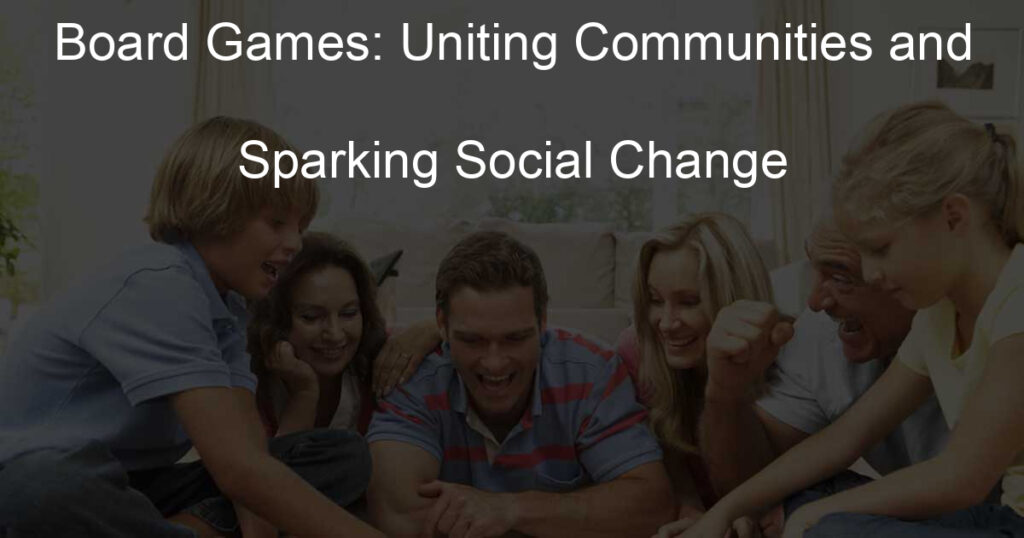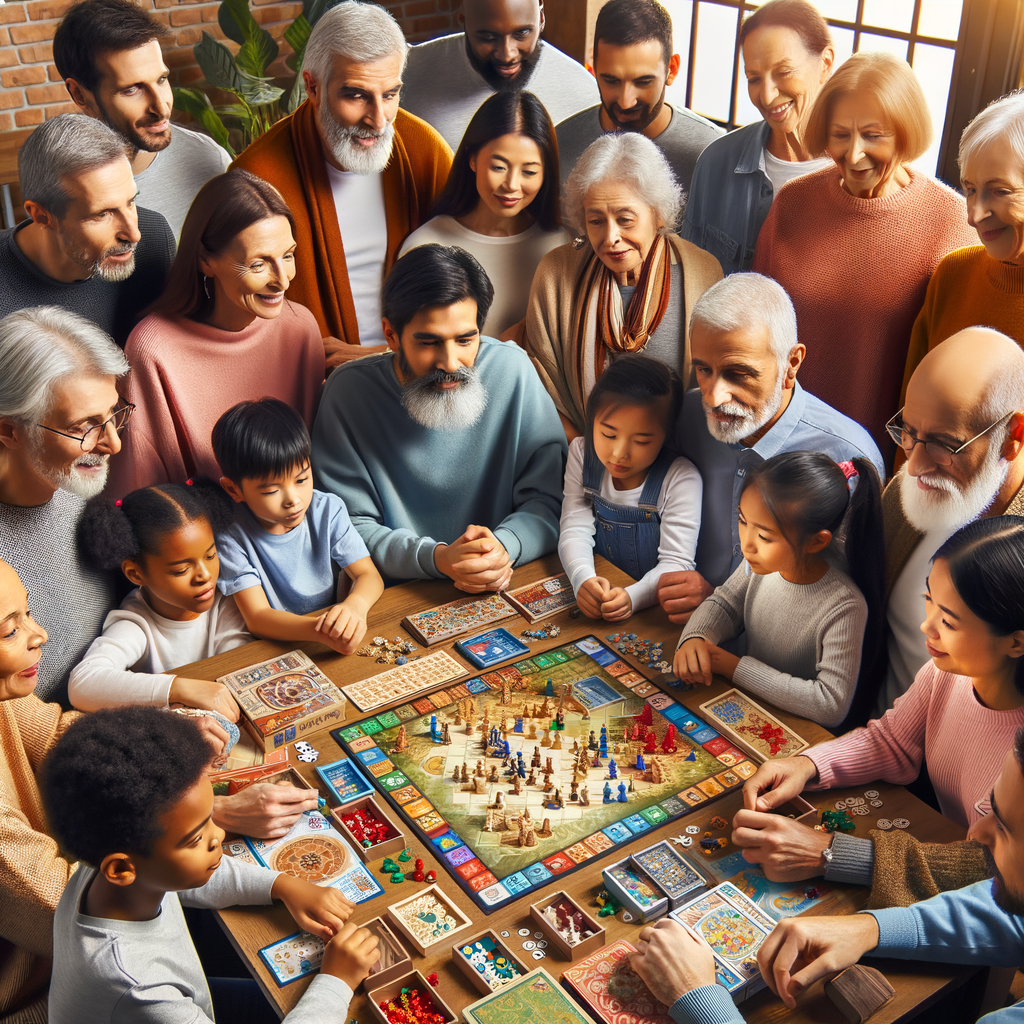Introduction to Board Games and Social Impact
Board games have been a part of human culture for thousands of years, providing entertainment and social interaction. But did you know they also have a significant social impact? Let’s dive into the fascinating world of board games and explore how they shape our society.
Understanding the Concept of Board Games
A board game is a tabletop game that involves counters or pieces moved or placed on a pre-marked surface or “board”, according to a set of rules. Some games are based purely on strategy, while others have an element of chance, and some are purely chance, with no element of skill.
Games usually have a goal that a player aims to achieve. Early board games represented a battle between two armies, and most modern board games are still based on defeating opponents in terms of counters, winning position, or accrual of points.
Exploring the Social Impact of Board Games
Board games are not just about fun and entertainment. They also play a significant role in our social interactions and development. Playing board games can lead to better social and communication skills, improved focus and memory, and advanced problem-solving abilities.
Moreover, board games can bring people together, fostering a sense of community and teamwork. They can bridge the gap between different age groups and cultures, promoting understanding and empathy. In a world where digital devices often isolate us, board games offer a unique opportunity to connect and interact on a personal level.
In the following sections, we will delve deeper into the communities formed around board games, how board games can drive social change, and the key social benefits of playing board games. We will also look at some case studies demonstrating the role of board games in social change. So, stay tuned!
Board Games Communities: A Closer Look
Board games have a unique way of bringing people together. They create communities that are bonded by shared interests and experiences. Let’s take a closer look at how these communities are formed and the role board games play in their development.
Formation of Board Games Communities
Communities centered around board games are formed in a variety of ways. Let’s explore some of the key factors that contribute to their formation.
- How board games bring people together
Board games are a social activity that encourages interaction and cooperation. They provide a platform for people to connect, communicate, and collaborate. Whether it’s a family game night or a gathering of friends, board games can bring people of different ages, backgrounds, and interests together. They create a sense of camaraderie and foster strong relationships among players. The shared experience of playing, winning, and even losing, can create lasting bonds.
- Role of board games in community building
Board games play a crucial role in community building. They serve as a common interest that unites individuals and encourages them to interact regularly. These games provide a fun and engaging way for community members to get to know each other better, build trust, and develop a sense of belonging. In many cases, board game communities also organize events, tournaments, and social gatherings, further strengthening the community spirit. The shared love for board games often transcends the game itself, leading to the formation of supportive, inclusive, and vibrant communities.
In conclusion, board games are more than just a source of entertainment. They are a powerful tool for bringing people together and building strong, cohesive communities. So, the next time you play a board game, remember that you are not just playing a game, but also contributing to a larger community.
Impact of Board Games on Society
Board games have a profound impact on society. They are not just a source of entertainment, but also a tool for social change. Let’s take a closer look at how board games contribute to society.
- Enhancing Social Interaction
Board games are a fantastic way to enhance social interaction. They bring people together, encouraging them to communicate, collaborate, and compete in a friendly environment. According to a study by University of Arizona, playing board games can increase the production of ‘feel-good’ hormones, leading to a more positive social interaction.
- Promoting Inclusivity and Diversity
Board games are inclusive by nature. They can be played by people of all ages, backgrounds, and abilities. This promotes diversity as players from different walks of life come together to play. For instance, the game Chess is played worldwide, transcending cultural and language barriers.
- Stimulating Cognitive Development
Playing board games can stimulate cognitive development. They challenge the mind, improving memory, concentration, and problem-solving skills. A study by the University of Montreal found that playing board games can help delay cognitive decline in older adults.
| Impact of Board Games | Examples |
|---|---|
| Enhancing Social Interaction | Increased ‘feel-good’ hormones |
| Promoting Inclusivity and Diversity | Chess played worldwide |
| Stimulating Cognitive Development | Delay in cognitive decline in older adults |
In conclusion, board games have a significant impact on society. They enhance social interaction, promote inclusivity and diversity, and stimulate cognitive development. So, the next time you play a board game, remember, it’s not just a game, it’s a tool for social change.
Social Change through Board Games: The Mechanism
Board games are not just for fun. They can also be powerful tools for social change. Let’s delve deeper into how this mechanism works.
Board Games as Tools for Education
Educators are increasingly recognizing the potential of board games as educational tools. They can help students develop important skills while also fostering a love for learning. Here’s how:
Board games in classrooms: Board games are becoming a common sight in classrooms around the world. Teachers use them to make learning more engaging and interactive. For instance, a game like ‘Ticket to Ride’ can help students understand geography and strategic thinking. Ticket to Ride is a board game that requires players to build train routes across different countries, teaching them about different locations and strategic planning.
Impact on learning and development: Board games can significantly impact learning and development. They can enhance critical thinking, problem-solving skills, and social interaction. According to a Wikipedia article on educational games, students who play board games show improved performance in subjects like math and science. They also develop better social skills as they learn to cooperate and compete in a healthy manner.
By integrating board games into the educational system, we can make learning more enjoyable and effective. This is just one way board games can contribute to social change. In the next section, we will explore how board games can address social issues.
Board Games and Social Issues
Board games are not just fun and engaging, they can also be powerful tools for addressing social issues. Through gameplay, they can stimulate conversations about critical topics, promote empathy, and even inspire players to take action for social change. Let’s delve into how this is achieved.
Addressing social issues through gameplay
Board games can act as a mirror to society, reflecting its complexities and challenges. They provide a safe space for players to explore difficult topics, such as inequality, racism, or climate change, in a non-threatening way. By simulating real-world scenarios, these games can help players understand the impact of their decisions and actions on others and the environment.
For instance, the game Pandemic teaches players about global health crises and the importance of cooperation to overcome them. In the game, players work together to prevent the spread of diseases and save the world, highlighting the need for collective action in the face of global challenges.
Examples of board games promoting social change
Several board games have been designed with the explicit goal of promoting social change. Let’s take a look at a few examples:
| Game | Social Issue Addressed |
|---|---|
| Rise Up: The Game of People & Power | This game encourages players to strategize and collaborate to build a social movement and overcome a system intent on stopping them. It fosters a sense of solidarity and the importance of collective action. |
| Train | Designed by Brenda Romero, this game confronts players with the horrors of the Holocaust, aiming to provoke deep thought and discussion about morality and history. |
These games not only entertain but also educate players about social issues and inspire them to think critically and empathetically. They demonstrate the potential of board games as tools for social change.
Social Benefits of Board Games: Key Takeaways
Board games are not just about fun and entertainment. They offer a plethora of social benefits that positively impact our lives. Here are the key takeaways from our discussion on the social benefits of board games:
- Enhancement of Social Skills
Board games are a great tool for enhancing social skills. They require interaction, communication, and cooperation among players. This encourages the development of essential social skills like empathy, negotiation, and patience. For instance, in a game like Monopoly, players negotiate and strategize with each other to win, thereby improving their interpersonal skills.
- Promotion of Healthy Competition
Healthy competition is another significant benefit of board games. They create a competitive environment where players strive to win, but in a friendly manner. This promotes sportsmanship and teaches players how to handle both victory and defeat gracefully. Games like Chess and Scrabble are excellent examples of games that foster healthy competition.
- Stress Relief and Mental Health Benefits
Playing board games can be a great stress reliever. They provide a break from our daily routines and digital screens, allowing us to relax and enjoy. Moreover, they stimulate our brains, helping to keep it sharp and healthy. Studies have shown that board games can even help reduce the risk of cognitive decline and dementia. So, next time you’re feeling stressed, consider playing a board game for a fun and beneficial escape.
In conclusion, board games are more than just a source of entertainment. They are a valuable tool for social development, promoting healthy competition, and providing mental health benefits. So, let’s embrace board games and enjoy their numerous benefits!
Case Studies: Role of Board Games in Social Change
Let’s dive into real-world examples of how board games have been used to foster social change. Our first case study focuses on community development.
Case Study 1: Community Development through Board Games
In this case study, we explore how a community used board games to enhance social interaction and foster development.
- Background of the community: The community in focus is a small rural town in the Midwest. The town had been struggling with social isolation and a lack of community engagement. The local leaders were looking for innovative ways to bring people together and foster a sense of community.
- Implementation of board games: The community leaders decided to introduce board games as a social activity. They organized weekly game nights at the community center, where everyone was invited to play and socialize. The games chosen were a mix of classic and new ones, designed to appeal to all age groups and interests. Board games were chosen because they are accessible, affordable, and promote social interaction and cooperation.
- Impact and results: The board game nights were a hit. Attendance at the community center increased, and people started interacting more with each other. The games provided a platform for people to connect, communicate, and collaborate. Over time, the community reported a decrease in social isolation and an increase in community engagement. The success of the board game nights even attracted the attention of neighboring communities, who started implementing similar initiatives.
In conclusion, this case study demonstrates the power of board games in fostering social change. By providing a platform for social interaction, board games can help build stronger, more engaged communities.
Case Study 2: Social Transformation via Board Games
Background of the social issue
Our society is often plagued by various social issues, one of which is the increasing isolation and lack of interpersonal communication among individuals. This issue has been further exacerbated by the digital age, where face-to-face interaction is often replaced by digital communication. This lack of personal interaction can lead to feelings of loneliness and social anxiety. Social isolation is a serious issue that needs to be addressed.
Role of the board game
Board games have emerged as a powerful tool to combat this social issue. They encourage face-to-face interaction, cooperation, and communication among players. A prime example of this is the board game “Pandemic”. This game requires players to work together to stop the spread of diseases across the globe. It promotes teamwork, strategic thinking, and communication among players. The game has been widely recognized for its ability to bring people together and foster social interaction.
Outcome and future implications
The use of board games like “Pandemic” has shown positive results in addressing the issue of social isolation. Players have reported feeling more connected and less isolated after participating in board game sessions. This has significant implications for the future, as it suggests that board games could be used as a tool to foster social interaction and combat loneliness. Furthermore, the success of “Pandemic” has inspired other game developers to create board games with similar social objectives.
In conclusion, board games have the potential to bring about significant social transformation. They can help to bridge the gap between individuals, foster a sense of community, and combat social issues like isolation. As we move forward, it is crucial to continue exploring the potential of board games in addressing social issues and fostering positive social change.
Conclusion: Board Games Influence on Social Interaction and Beyond
As we draw our exploration to a close, it’s clear that board games are not just a source of entertainment. They are a powerful tool that can shape our social interactions and contribute to social change. Let’s recap and look at what the future might hold.
- Recap of the social impact of board games
Throughout this article, we’ve delved into the profound social impact of board games. They foster a sense of community, encourage cooperation, and promote healthy competition. Board games have been shown to bridge generational gaps, foster empathy, and even contribute to social change. From Monopoly teaching us about economic principles to Pandemic raising awareness about global health issues, board games have proven their worth as a social tool.
- Future prospects for board games in social change
Looking ahead, the potential for board games to effect social change is vast. With the rise of educational board games, we can expect to see more games designed with the explicit purpose of teaching social, economic, and environmental concepts. As technology continues to advance, we may also see a fusion of traditional board games with digital elements, opening up new avenues for social interaction and learning. The future of board games is bright, and we look forward to seeing how they will continue to shape our society.
In conclusion, board games are more than just a pastime. They are a reflection of our society and a tool for positive change. So, the next time you sit down to play a game, remember – you’re not just having fun, you’re participating in a social phenomenon that has the power to shape our world.




